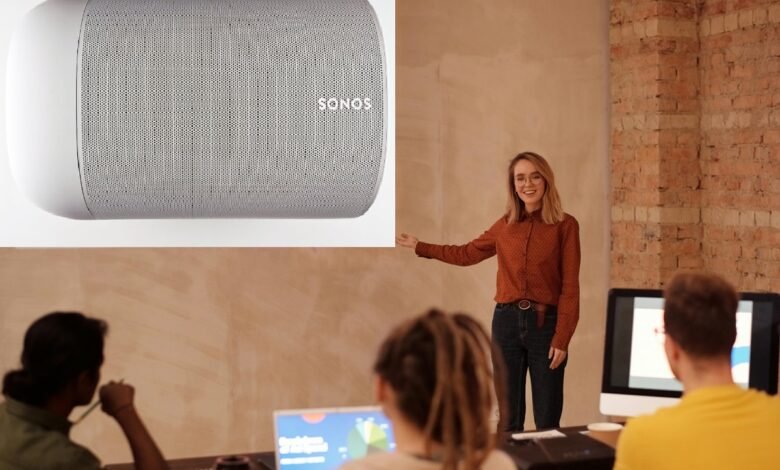Google Triumphs: Group Sonos Speaker Controls Revived Post Sonos Battle

Sonos Speaker Lawsuit: Control Your Listening Party
Sonos speaker, before we get into the legal turmoil, let’s first grasp the technologies involved. Group speaker controls let you control music playback across several speakers in your home. Consider establishing the mood for a movie night by effortlessly blasting the soundtrack around your living room, kitchen, and even the patio! This feature was a game changer, and Sonos, a pioneer in this field, claimed Google violated its patents on this technology (Sonos Multiroom Audio Patent).
Android Authority’s Mishaal Rahman claims that the group speaker volume controls feature is returned in Android 15 Beta 2. “Google intentionally disabled this functionality on Pixel phones back in late 2021 due to a legal dispute with Sonos,” says Rahman. “In late 2023, Google announced it would bring back several features they had to remove, following a judge’s overturning of a jury verdict that was in favor of Sonos.” According to the article, when you create a speaker group with Assistant-enabled devices in the Google Home app, you can cast audio from your phone using a Cast-enabled app.
How a Legal Battle Changed Multi-Room Audio (Easy Smart Home Music)
Consider this: you’re preparing a delicious supper, and the mood is ideal. All you need is the appropriate soundtrack playing around your home. Instead of racing for your phone, you simply say, “Hey Google, play jazz everywhere!” Suddenly, your favorite songs fill every room, setting the tone for a wonderful evening. This seamless multi-room music control experience was at the center of a recent legal struggle between Google and Sonos (Sonos Lawsuit Smart Home).
The complaint relied on certain Sonos speaker app features that allowed users to control speaker groupings. Google said that these characteristics were not unique and came under the legal principle of “fair use,” which allows for limited use of copyrighted content without authorization. The initial court verdict sided with Sonos, limiting Google’s ability to provide Google Assistant Groups alongside Google Assistant. This decision shook the tech world, sparking concerns about suppressing innovation and restricting customer choice in the smart home music system market.
The new Sonos Ace, unveiled Tuesday, is an over-ear model aimed at competing with high-end headphones from Apple Inc., Sony Group Corp., and Bose Corp. The smartphone will be available in black or white beginning June 5. Though the Ace does not appear to be significantly different from competing products, Sonos intends to highlight its audio performance and ability to integrate seamlessly with the rest of the company’s lineup. Sonos speaker
“This has been the most requested product from our customers of all time,” Sonos CEO Patrick Spence stated in an interview. “Tens of thousands of customers have reached out asking for headphones, and that’s pretty amazing.”
Read More:- New Windows 11 Recall: Powerful Tool or Privacy Nightmare? Captures Every Screen, Powerful Yet Alarming.
Google’s Appeal and a Memorable Turn of Events
Google refused to give up and appealed the court verdict. Their argument centered on contesting the validity of Sonos’ patents and demonstrating how their implementation of group speaker controls differed from Sonos’ technology. This time, the court found in favor of Google, overturning the prior verdict. The judge’s rationale emphasized fair use, acknowledging that certain capabilities are critical for competitiveness and improvements in the technological landscape.
The Impact of a Reshaped Soundscape on Your Hearing
The current court verdict is a major victory for Google. It enables them to fully integrate group speaker controls with Google Assistant, providing a more seamless and unified experience for Google ecosystem fans (Best Multi-Room Audio System for Google Home). But the repercussions extend far beyond Google and Sonos. Sonos speaker
The multi-room audio control market may become more competitive as a result of this ruling. With Google returning to the market, customers may enjoy more options and possibly even cheaper smart home music systems. The decision may also promote cooperation amongst tech firms, resulting in a more cohesive smart home ecosystem where many brands’ products operate more seamlessly together. But there are also some worries about possible platform standardization, which could reduce consumer options in the future.
Home Music of the Future with Google AI
Even though the court case made headlines, Google’s multi-room audio research has a lot of potential for the future. Google AI, their artificial intelligence branch, is always advancing the field in fields like voice recognition and natural language processing. These developments have the potential to completely change how we use our speaker systems. Imagine being able to control music with voice commands based on your mood, alter the level in particular rooms, or even have the audio change dynamically dependent on the acoustics of the room—all without using your hands!
Sonos might use a lift. Earlier this month, the company reported a larger quarterly loss than expected, pushing its stock down. Revenue fell by 17%.
Spence, who took over as CEO in 2017, believes the headphones will bring more people into the company’s ecosystem and increase revenue. Sonos expects to generate up to $1.7 billion in total sales during fiscal 2024, which runs through September.
Final Notes
The Sonos lawsuit exemplifies the delicate relationship between innovation, intellectual property rights, and customer choice in the technology industry. While robust competition is essential for progress, excessively restrictive legal battles can stymie advancements. Finding the appropriate balance is critical for a successful smart home ecosystem that meets user needs and promotes continual improvement. The Google-Sonos war teaches vital lessons about the need of collaboration, open standards, and a focus on user experience in shaping the future of smart home technology, ensuring a symphony of innovation and choice for music lovers everywhere.



